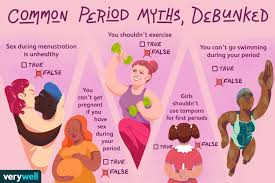![]() Myths vs. Facts About Periods
Myths vs. Facts About Periods
1. Myth: You shouldn’t exercise during your period.
Fact: Light to moderate exercise (like walking, yoga, or stretching) can actually reduce cramps and improve mood.
2. Myth: Period blood is dirty blood.
Fact: Menstrual blood is a mix of blood, uterine tissue, and mucus — it’s not impure or “dirty.”
3. Myth: Bathing during periods is harmful.
Fact: Bathing or taking a warm shower helps maintain hygiene and can ease cramps.
4. Myth: You cannot get pregnant during periods.
Fact: While chances are lower, pregnancy is still possible if ovulation overlaps with bleeding days.
5. Myth: Periods should always be painful.
Fact: Mild cramps are common, but severe pain is not normal and may indicate conditions like endometriosis or PCOS.
6. Myth: Menstrual cycles are always 28 days.
Fact: A healthy cycle can range from 21 to 35 days, and slight variations are normal.
7. Myth: Using tampons or menstrual cups causes loss of virginity.
Fact: Virginity is not defined by the hymen. Tampons/cups are safe and hygienic choices.
8. Myth: Periods are shameful and should be hidden.
Fact: Menstruation is a natural biological process — nothing to feel ashamed about.
9. Myth: Eating sour food or cold food stops periods.
Fact: No food can stop or pause menstruation. Diet may influence cramps but not the flow itself.
10. Myth: Skipping periods with medication is unsafe.
Fact: Under a doctor’s supervision, it’s safe to delay or manage periods with prescribed medicines
MBH/PS
